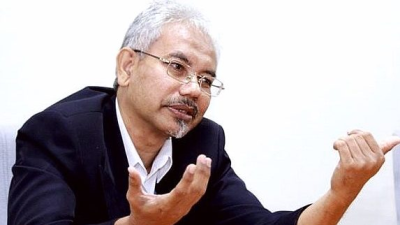
In today’s article, I wish to share my own practice of “interpreting” the Qur’an and the hadith that would help others to better appreciate the delicate situation of being in an open society and treading a fine line between being accused of religious sedition or having a critical perspective on issues deemed sensitive.
This article is sparked by two recent events that would not have happened, or would not have been taken advantage of by opportunistic or ignorant personalities to drive a wider edge between Islam and others. The first was the accusation of two important institutions in civil society and several personalities that the Unity Government is pandering to extremist Islam by instituting the Imam Nawawi’s 40 Hadith book, of which one of the hadith was about encouraging Muslims to war with others of different faith and belief.
The second incident is a non-Muslim MP accused by a rowdy politician from Kedah that he has insulted Islam by providing his own interpretation of the Qur’an to argue his case on a policy discussion in parliament.
As a Malaysian and a Muslim I wish to ask the non-Muslim citizenry to consider some guidelines that may be a bit of a hassle but in the long run would provide a better and meaningful result in the process that would rebuild this country towards mutual respect, wisdom, and harmony.
First of all, non-Muslims must understand that the words of the Qur’an and the Hadith are both considered “sacred” texts. The Qur’an is considered as the literal words of Allah while the hadiths are written accounts of the Prophet’s Muhammad’s saying, actions and silence on many matters.
The Hadith compilation, even though not the words of Allah, its science of scrutiny as to its verification is incredibly rigorous.
Malaysians can Google the rigorous process of scrutinizing the hadith considered “valid” or “authentic” in the Sunni collection of Bukhari, Muslim, Abu Dawud, Tirmidhi, An-Nasai and Ibn Madja.
I have read all the hadiths in five of the six compilations totaling more than 20,000 which are translated into English and Indonesian. Both the Qur’aninc verses and the hadith compilation in the six books are used not only as a spiritual and moral guide to Muslims, they both form the foundation of legal matters pertaining to the Islamic way of life. Thus, Malaysians must NOT consider quoting a hadith or a Qur’anic verse just like quoting an author writing in a book or the statement of an important personality.
To Muslims, such treatment of the Qur’an and the Hadith in this manner is considered disrespectful and academically wrong.
Why should the Qur’an and the Hadith be treated carefully and not quoted like a journal paper?
Firstly, there is the consideration of the Arabic language. Not only is the Qur’an in Arabic originally, it is of “old” Arabic, thus, like Bahasa Melayu, many words used 1,500 years ago and in the present may no longer be the same and may be lost through time. Thus, experts in Arabic language need to explain such use of words within a cultural, historical and temporal context.
Secondly, the Qur’an and the Hadith are not written by someone sitting down calmly and writing essays upon essays until the writing becomes a book. Both of the Qur’an and the Hadith are not books as we understand it. They are merely called “kitab” or books but really meant to refer to “teachings” or “news.”
No one knows why the Qur’an is arranged in its present format, but it was mentioned that the Prophet had recited the Qur’an to the Angel Gabriel many times before his earthly passing. Furthermore, the Qu’ran and the Hadith are words that reflect a particular situation or event that the Prophet faced. Thus, knowing the Asbabun Nuzul or the reason why Qur’anic verses were revealed is of absolute importance in order to extract the temporal and eternal message.
Similarly, with the War Hadith in the Nawawi book, it was recorded for a certain purpose to reflect a certain event and period of the Prophet Muhammad.
Without knowing these historical origins, one cannot comprehend the true meaning of the verses and narration.
Finally, the methodology of extracting a meaning or lesson for present-day time requires the Verse or the hadith to be subjected to the considerations of many other Verses or narrations of a similar subject matter, like war or zakat.
After much contextual considerations can a person carefully phrase his own “possible” interpretation as it relates to a present discourse on policy of other aspects of concerns.
Thus, in both events, the MP that used the Qur’an and the respected bodies that criticize the government on the Nawawi issue might find value in a few simple steps I am suggesting to avoid giving fuel to Muslim bigots in the country.
The first step is to read two or three commentaries by respected Muslim scholars on a specific Verse of the Qur’an or the narration of a hadith. Secondly, check that these scholars are generally accepted by Muslims of one school say the Sunni sect. Using a Shi’a scholar in interpreting may not go down well with Muslims in this country. Thirdly, find two or three Muslim scholars who have commented on the same issue that you are raising. Fourthly, after writing your argument with all the scholars cited, test it out on one or two Muslim scholars and get their feedback.
Laborious, right? Well, that’s how it should be. Thus, no one can say that you misinterpret the Qur’an or the hadith because you have used the scholars as your academic shield.
Even quoting Anwar Ibrahim, say on the LGBT issue, should take into consideration the probable intention of the questioner, the opportunistic opposition that is ready to pounce on the PM, the voracious media that has no conscience but looking for “hits” on the web portal, and the cultural understanding of Muslims in general in Malaysia.
When Anwar the man speaks, Anwar the PM gets blamed. The manner in which many commentators who are non-Muslims commenting on Anwar’s statement, I gather, for me, seem to border on spite, fear, callousness of Islam and pure ignorance.
There is no training apparently, in universities on the analysis of verbal comments or scripture in our everyday dealings. We are as well educated as the ChatGPT… and I am being very kind in my assessment.
In conclusion, I wish to say that any scripture, if quoted, is a blessing to all but it needs to be treated with utmost respect and humility. Whether Malaysians understand the words “respect” and “humility” begs a whole discourse in itself. Democracy is for the wise, the responsible, and the ones who respect others.
I am a Malaysian who welcome honest and respectful discussions on any issue using any quote from anywhere, but it must follow certain critical contextualization using multiple source verification and above all, presented in a wisdom-respectful manner.
(Prof Dr. Mohd Tajuddin Mohd Rasdi is Professor of Architecture at a local university and his writing reflects his own personal opinion entirely.)
ADVERTISEMENT
ADVERTISEMENT





































